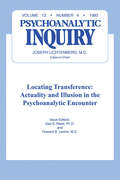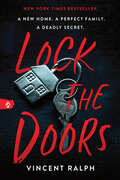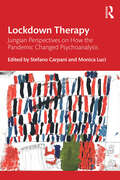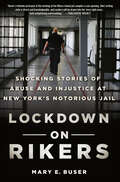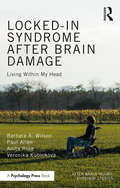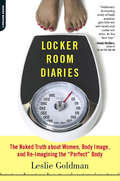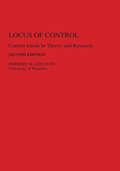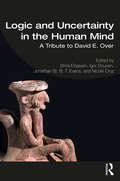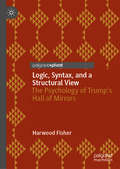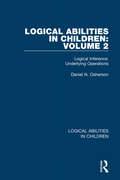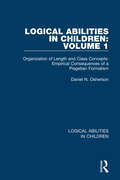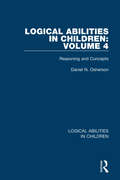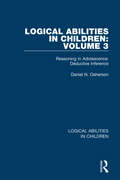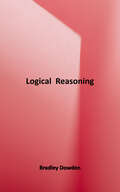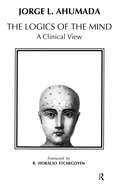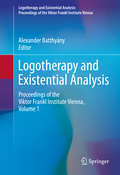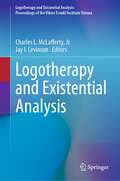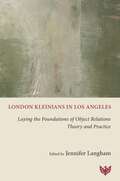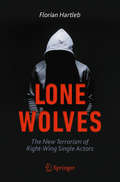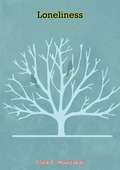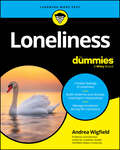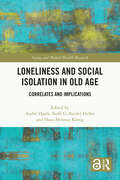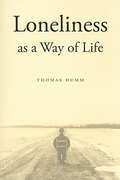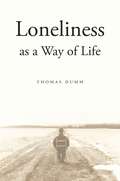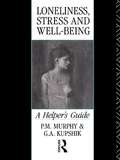- Table View
- List View
Locating Transference: Psychoanalytic Inquiry, 13.4
by Gail S. Reed Howard B. LevineFirst published in 1993. Routledge is an imprint of Taylor & Francis, an informa company.
Lock the Doors
by Vincent RalphA New York Times Bestseller and 2023 Edgar Award Nominee for Best Young Adult!The truth won't stay hidden behind locked doors.An addictive, psychological thriller from the New York Times bestselling author of 14 WAYS TO DIE.Tom's family has moved into their dream home. But pretty soon he starts to notice that something is very wrong—there are strange messages written on the wall and locks on the bedroom doors. On the OUTSIDE. The previous owners have moved just across the road, and they seem like the perfect family. Their daughter, Amy, is beautiful and enigmatic, but Tom is sure she's hiding something. And he isn't going to stop until he finds the truth behind those locked doors. . .Will their dream home become a nightmare?Lock the Doors is perfect for readers looking for:Phycological thrillersDetermined characters who persevereShort chapters with action-packed, heightened tensionUnputdownable and bingeworthy novelsBooks by Karen McManus, Holly Jackson, and Lisa Jewell
Lockdown Therapy: Jungian Perspectives on How the Pandemic Changed Psychoanalysis
by Monica Luci Stefano CarpaniThis fascinating volume explores — from the perspective both of analysts and their patients—how the COVID-19 pandemic quickly and unexpectedly created profound and lasting changes in the ways psychoanalysis is conducted, and what those changes mean for analysis moving forward. The first part of the book is made up of interviews conducted by Stefano Carpani with authoritative authors in analytical psychology during the earliest phase of lockdown, centered on themes of the pandemic, lockdown, and how each individual was coping with the challenges those circumstances brought on. The second part features personal essays that further details the subjective experiences of Jungian analysts and therapists worldwide, comprising a collection of reflections on how COVID-19 affected and changed the way analysts work with patients. These reflections focus on the theoretical, clinical, technical, and also practical points of view, including clinical materials on transference and counter-transference considerations. The third part of the book is specular to the second and offers reflections from patients’ perspective on how the pandemic changed their therapies and lockdown affected their experience of therapy. Patients have provided anonymous testimonies through their writing of how they experienced of the change of setting, mindset and related implications. A comprehensive overview of an important and ongoing conversation, Lockdown Therapy is crucial reading for Jungian analysts and scholars, as well as other clinicians training in analysis, psychotherapy and counselling.
Lockdown on Rikers: Shocking Stories of Abuse and Injustice at New York's Notorious Jail
by Mary E. BuserMary Buser began her career at Rikers Island as a social work intern, brimming with ideas and eager to help incarcerated women find a better path. Her reassignment to a men's jail coincided with the dawn of the city's "stop-and-frisk" policy, a flood of unprecedented arrests, and the biggest jailhouse build-up in New York City history.Committed to the possibility of growth for the scarred and tattooed masses who filed into her session booth, Buser was suddenly faced with black eyes, punched-out teeth, and frantic whispers of beatings by officers. Recognizing the greater danger of pointing a finger at one's captors, Buser attempted to help them, while also keeping them as well as herself, safe. Following her promotion to assistant chief, she was transferred to different jails, working in the Mental Health Center, and finally, at Rikers's notorious "jail within jail," the dreaded solitary confinement unit, where she saw horrors she'd never imagined. Finally, it became too much to bear, forcing Buser to flee Rikers and never look back - until now.Lockdown on Rikers shines a light into the deepest and most horrific recesses of the criminal justice system, and shows how far it has really drifted from the ideals we espouse.
Locked-in Syndrome after Brain Damage: Living within my head (After Brain Injury: Survivor Stories)
by Barbara Wilson Paul Allen Anita Rose Veronika KubickovaThe newest title in the series Survivor Stories, this book tells the story of Paul Allen, a photographer who likes opera and was a good baritone singer. At the age of 56 he sustained a stroke that left him paralysed and speechless. He has Locked-In Syndrome (LIS), a rare consequence of brain damage. Although Paul is fully conscious and his cognitive abilities are intact, he is unable to move or speak due to the paralysis of nearly all his voluntary muscles. However, Paul is keen to communicate and through his eye movements he tells his story, from his early life, career, singing and other interests, to the details of his stroke and the effects it has had on his life. The book also includes contributions from Paul’s wife Liz, who tells the story from her point of view, along with Paul’s physiotherapists, occupational therapists, speech therapists, psychologists and others from the Raphael Hospital who have assisted in Paul’s rehabilitation. In telling of his frustrations, his successes, his views on life and how he sees his future, Paul raises awareness of the quality of life possible for those with LIS. Combining scientific knowledge with personal narrative, this unique and optimistic book is of huge importance to any professional involved in the care of someone with a brain injury, and to the individuals and families touched by LIS.
Locker Room Diaries: The Naked Truth about Women, Body Image, and Re-imagining the "Perfect" Body
by Leslie GoldmanI wish my thighs were smaller. "If only I could lose ten pounds. " A wake-up call for any woman who has engaged in the "if only" wishing game,Locker Room Diariesuses the unique lens of the locker room to reveal what, exactly, goes into "shaping" not just a woman's body but her body image. The locker room can be a wondrous retreat, a place to toss aside the worries of the day, but it is also where our flaws become most apparent-and where most of us can't help but wonder how we "measure up. " Often dressed in no more than a towel, Leslie Goldman spent five years talking with women of all shapes and sizes about their body image, from taut twenty-somethings to heavyset seniors. Why is it, she asks, that almost no one seems satisfied with her physique? From compulsive workouts to daily dates with the scale, from bikini waxes to body fat measurements, American women are swept up in a constant quest for the "perfect" body. Thankfully, more than one woman reveals how she halted her cycle of self-loathing and learned to like her bodyas is. Blending expert opinion with wonderfully intimate, often laugh-outloud, confidences,Locker Room Diarieswill inspire anyone who knows the highs of exercise to leave the lows of self-esteem behind-and, most especially, once and for all, to step off that scale!
Locus of Control: Current Trends in Theory & Research
by Herbert M. LefcourtFirst published in 1982. Routledge is an imprint of Taylor & Francis, an informa company.
Logic and Uncertainty in the Human Mind: A Tribute to David E. Over
by Shira ElqayamDavid E. Over is a leading cognitive scientist and, with his firm grounding in philosophical logic, he also exerts a powerful influence on the psychology of reasoning. He is responsible for not only a large body of empirical work and accompanying theory, but for advancing a major shift in thinking about reasoning, commonly known as the ‘new paradigm’ in the psychology of human reasoning. Over’s signature mix of philosophical logic and experimental psychology has inspired generations of researchers, psychologists, and philosophers alike over more than a quarter of a century. The chapters in this volume, written by a leading group of contributors including a number who helped shape the psychology of reasoning as we know it today, each take their starting point from the key themes of Over’s ground-breaking work. The essays in this collection explore a wide range of central topics—such as rationality, bias, dual processes, and dual systems—as well as contemporary psychological and philosophical theories of conditionals. It concludes with an engaging new chapter, authored by David E. Over himself, which details and analyses the new paradigm psychology of reasoning. This book is therefore important reading for scholars, researchers, and advanced students in psychology, philosophy, and the cognitive sciences, including those who are not familiar with Over’s thought already.
Logic, Syntax, and a Structural View: The Psychology of Trump's Hall of Mirrors
by Harwood FisherThis book presents a new structural approach to the psychology of the person, inspired by Kenneth Colby’s computer-generated simulation, PARRY. The simulation was of a paranoid psychological state, represented in forms of the person's logic and syntax, as these would be evidenced in personal communication. Harwood Fisher uses a Structural View to highlight similarities in the logical form of the linguistic representations of Donald Trump, his avid followers (“Trumpers”), and the paranoid—referred to as “The Trio.” He demonstrates how the Structural View forms a series of logical and schematic patterns, similar to the way that content analysis can bring forth associations meanings, and concepts held in the text. Such comparisons, Fisher argues, can be used to shed light on contingencies for presenting, representing, and judging truth. Specifically, Fisher posits that the major syntactic and logical patterns that were used to produce the computer-generated “paranoid” responses in Colby’s project can be used to analyze Donald Trump’s rhetoric and his followers’ reactions to it. Ultimately, Fisher offers a new kind of structural approach for the philosophy of psychology. This novel work will appeal to students and scholars of social and cognitive psychology, psychology of personality, psychiatric classification, psycholinguistics, rhetoric, and computer science.
Logical Abilities in Children: Logical Inference: Underlying Operations (Logical Abilities in Children #2)
by Daniel N. OshersonOriginally published in 1974, the second volume of four (Logical Inference: Underlying Operations) provides a process-model for the solution of certain syllogistic reasoning problems. Testable predictions of the model are easily derived, and the available evidence supports the model’s description of the real-time mental steps mediating these logical abilities. A theory of development, connected to the model, makes these volumes all the more important for cognitive, developmental, and educational psychologists, as well as educators and linguists.
Logical Abilities in Children: Organization of Length and Class Concepts: Empirical Consequences of a Piagetian Formalism (Logical Abilities in Children #1)
by Daniel N. OshersonOriginally published in 1974, a wide and interesting set of intellectual abilities in children are examined here. Volume 1 of 4 (Organization of Length and Class Concepts: Empirical Consequences of a Piagetian Formalism) converts an axiomatization of classes and asymmetrical relationships (proper to Piaget’s discipline of Genetic Epistemology) into a model of the development of these notions in children. Here may be one of the only attempts to derive predictive consequences from the more philosophically oriented writings of the Genevan School.
Logical Abilities in Children: Reasoning and Concepts (Logical Abilities in Children #4)
by Daniel N. OshersonOriginally published in 1976, this fourth and final volume in a series that met with critical acclaim is concerned with a certain kind of answer to the question "What distinguishes the concepts that are a natural part of human languages from those that are merely expressible in language?" The kind of answers contemplated rely on formal properties of the logics that overlay the two sorts of concepts. The author presents a substantive theory of natural concepts which helps to make concrete the methodological proposals. In order to make the theory more manageable, it is restricted to sentential modifiers expressed in English. Although these proposals are substantive, the methodology they exemplify may be of even more significance. Some of the ideas in the author’s approach derive from the work of Chomsky, and several issues relevant to the growth of logical thinking are also treated with data that speak to questions raised in Volume 3, concerning qualitative change through development. This final volume in the series will be essential reading for all concerned with both logical abilities in children, their development, and novel methodological approaches to research bearing on this and related issues.
Logical Abilities in Children: Reasoning in Adolescence: Deductive Inference (Logical Abilities in Children #3)
by Daniel N. OshersonOriginally published in 1975, this volume (3 of 4) presents an expanded model of certain deductive abilities in children and adults. A partial explanation of the growth of these abilities was suggested in Volume 2 of this series, and it is amplified here, both with regard to propositional logic and the logic of class inclusion. A new methodology is employed, the issue of the effect of content in deductive reasoning is covered, and developmental questions are reformulated. Although only data from experiments with adolescents are presented here, the volume sets the stage for potentially illustrating developmental comparisons, a topic pursued in Volume 4 of this novel and inventive series.
Logical Reasoning
by Bradley H. DowdenThis book is designed to engage students' interests and promote their writing abilities while teaching them to think critically and creatively. Dowden takes an activist stance on critical thinking, asking students to create and revise arguments rather than simply recognizing and criticizing them. His book emphasizes inductive reasoning and the analysis of individual claims in the beginning, leaving deductive arguments for consideration later in the course.
Logics of the Mind: A Clinical View
by Jorge L. AhumadaThis collection of papers, spanning the last fifteen years, presents a spirited defence of Freud's clinical method, considering the 'crisis of psychoanalysis' in the wider context of a crisis of reflective thought in society as a whole. Expressing the wish to 'clarify and polish the glass through which we see the psychoanalytic experience', Jorge Ahumada seeks to redefine the functions of psychoanalysis for the era of mass media, in which the classic Freudian neuroses have mostly been replaced by what he terms 'pathologies of peremptory gratification'.
Logotherapy and Existential Analysis
by Alexander BatthyányThis landmark volume introduces the new series ofproceedings from the Viktor Frankl Institute, dedicated to preserving the past,disseminating the present, and anticipating the future of Franklian existentialpsychology and psychotherapy, i. e. logotherapy and existentialanalysis . Wide-rangingcontents keep readers abreast of current ideas, findings, and developments inthe field while also presenting rarely-seen selections from Frankl's work. Established contributors report on new applications of existential therapies inspecific (OCD, cancer, end-of-life issues) and universal (the search formeaning) contexts as well as intriguing possibilities for opening up dialogue withother schools of psychology. And this initial offering establishes the tenor ofthe series by presenting varied materials across the field, including: Archival and unpublished articles and lectures by Frankl. Peer-reviewed studies on logotherapy process, measures, and research. New case studies using logotherapy and existential analysis in diverse settings. Papers advocating cross-disciplinary collaboration. Philosophical applications of existential psychology. Critical reviews of logotherapy-related books. Volume 1 of Logotherapyand Existential Analysis willattract a wide audience, including psychologists (clinical, social,personality, positive), psychotherapists of different schools, psychiatrists inprivate practice, and researchers in these fields. Practitioners in counseling,pastoral psychology, coaching, and medical care will also welcome this newsource of ideas and inspiration.
Logotherapy and Existential Analysis (Logotherapy and Existential Analysis: Proceedings of the Viktor Frankl Institute Vienna #2)
by Charles L. McLafferty Jay I. LevinsonThe second volume in the series presents ground-breaking advances of Viktor Frankl’s logotherapy and existential analysis, with emphasis on the discovery of meaning as central to coping, resilience, and growth. Noted contributors from around the world present empirical and case study evidence for the importance of meaning in diverse populations and settings, as well as theoretical and philosophical perspectives on Frankl’s body of thought. The book opens with a historical perspective of the development of logotherapy and personal experiences of those close to Frankl. A section on the amelioration of suffering provides insights into moral injury and finding meaning in blows of fate (unavoidable suffering, death, the injustice of poverty, and international conflict). Powerful case studies address Frankl’s tragic triad (guilt, suffering, death): facing the end of life, PTSD, childhood sexual abuse/neglect, and suicide prevention. Empirical studies address the search for purpose in life, qualities of meaning among the gifted, and service motivation in college students. Meaning-centered approaches are applied to working with youth and adults in schools and the workplace. Philosophical applications of logotherapy connect Frankl’s theory with Buddhist thought and a flaw in the nature vs. nurture theory; the dimensional ontology is expanded into four dimensions. Book reviews evaluate topics of interest to logotherapists. Topics include:Case studies using logotherapy in diverse settings Meaning-centered programs and interventions in the workplace Innovative approaches to finding meaning with at-risk children and young adults Applications of logotherapy in military and childhood PTSD Cross-disciplinary collaboration of logotherapy with rational-emotive therapy, cognitive behavior therapy, positive psychology and Theravāda Buddhism Philosophical applications and extensions of logotheory Empirical studies on processes and measures of logotherapy Volume II of Logotherapy and Existential Analysis is intended for caregivers, practitioners, researchers, and students in the fields of logotherapy, mental health, education, workplace management, industrial psychology, and laypeople interested in finding meaning.
London Kleinians in Los Angeles: Laying the Foundations of Object Relations Theory and Practice
by Jennifer LanghamIn 1968, Wilfred Bion and Albert Mason emigrated to Los Angeles at the invitation of a group of young analysts to teach and train local clinicians in the British object relations tradition. They were joined by Susanna Isaacs Elmhirst for a period. London Kleinians in Los Angeles is a colorful account of the early days of psychoanalysis in LA, punctuated by in-person presentations from the leading Kleinians of the day, including Hanna Segal, Herbert Rosenfeld, Donald Meltzer, and Wilfred Bion himself. Their unpublished lectures from the 1960s and 1970s appear in Part I. Part II features seminal papers by the founding fathers of the Psychoanalytic Center of California (PCC): James Gooch, James Grotstein, Arthur Malin, and Albert Mason, the group's leading spokesperson. PCC continues to function as a vital center of psychoanalytic training and education in the British object relations tradition. The unearthing of four unpublished contributions from four founding Kleinians is an incredible find for psychoanalysis and this book is highly recommended to all professionals and trainees in the field. Those with an interest in the history of psychoanalysis will find much to excite them.
Lone Wolves: The New Terrorism of Right-Wing Single Actors
by Florian HartlebAs the attacks in Norway, Munich and most recently Christchurch have shown: a new threat is now shaking liberal Western societies. Radicalized right-wing extremists – so-called lone wolves – are engaging in individually planned terror attacks. Written by an expert on terrorism and populism, this book highlights the dynamics of this new breed of terrorism. By providing in-depth insights into the biographies of individual perpetrators, it illustrates the changing profile of the typical lone terrorist. This new kind of terrorist engages in violence without being a member of a party or organization, yet is radicalized by a global right-wing subculture that communicates in virtual networks. This startling and well-written book reveals the ideological roots of lone wolf terrorism and urges governments and civil society to take the threat seriously and implement suitable countermeasures.
Loneliness
by Clark E. MoustakasLONELINESS...is an intrinsic condition of human existence. This study of existential loneliness reveals that--beyond the first pangs of desolation, out of the terror of despair--human beings have found a key to deeper insight and keen perception of the world in which they live.This absorbing book provides an impetus toward renewed awareness of self, challenging and encouraging the reader to make a penetrating investigation of his own solitude.
Loneliness For Dummies
by Andrea WigfieldCombat the rising epidemic of loneliness with trustworthy information and advice Loneliness for Dummies helps readers understand loneliness and how to take steps to overcome this unwanted feeling. At some point in life, loneliness affects everyone. It can be triggered by unusual situations and events like children leaving home, losing a loved one, working remotely, moving, divorce, or retirement. It can also occur seemingly without reason. Thanks to this book, you don’t have to be afraid of being lonely. Loneliness For Dummies explains that loneliness is a natural reaction that signals us to make a change. You’ll learn the signs to look out for to assess loneliness, why people feel lonely, and most importantly, step-by-step actions you can take to reduce your feelings of loneliness. Read case studies of people who have felt lonely to see how they overcame loneliness. This book includes a simple scale to help you measure how lonely you feel, so you can identify which changes to make and assess your progress. Learn why people feel lonely, including the situations that trigger loneliness and what this uncomfortable feeling means Discover the signs of loneliness so you can recognize it in others and step in to help Complete a questionnaire to gauge your own loneliness and identify steps you can take to feel less lonely Make changes to your lifestyle that will lead to greater satisfaction in the long runThis is the perfect Dummies guide for anyone who is currently feeling adrift without social connections and wants to make a change. Organizations looking for a reference for students or outreach professionals will also appreciate Loneliness For Dummies.
Loneliness and Social Isolation in Old Age: Correlates and Implications (Aging and Mental Health Research)
by Steffi G. Riedel-Heller André Hajek Hans-Helmut KönigThis book is a seminal guide to loneliness and social isolation in old age, providing a comprehensive overview of the important correlates of socioeconomic, health and lifestyle factors upon loneliness and social isolation in old age. Bringing together contributions from leading authorities, the book showcases expertise from, among other things, medicine, psychology, epidemiology, sociology, economics and gerontology. It shows the importance of identifying factors associated with loneliness and social isolation among older adults from a broader perspective, and includes discussion of a range of topics including income poverty, physical activity, family care and frailty. The chapters are evidence-based and offer a mix of empirical studies as well as reviews of international research. The book also discusses policy implications and provides an overview of nationally representative cohort studies around the world available to researchers quantifying loneliness or social isolation. This book is unique in examining loneliness and social isolation from such wide-ranging perspectives and will be essential reading for researchers and postgraduate students in the areas of e.g., mental health research, social work, and psychiatry. Health professionals involved with gerontology and geriatrics will also find this book of benefit. With the exception of Chapter 17, the Open Access version of this book, available at http://www.taylorfrancis.com, has been made available under a Creative Commons (CC-BY) 4.0 license.
Loneliness as a Way of Life
by Thomas DummThe modern individual, Dumm suggests, is fundamentally a lonely self. Through reflections on philosophy, political theory, literature, and tragic drama, he proceeds to illuminate a hidden dimension of the human condition.
Loneliness as a Way of Life
by Thomas Dumm“What does it mean to be lonely?” Thomas Dumm asks. His inquiry, documented in this book, takes us beyond social circumstances and into the deeper forces that shape our very existence as modern individuals. The modern individual, Dumm suggests, is fundamentally a lonely self. Through reflections on philosophy, political theory, literature, and tragic drama, he proceeds to illuminate a hidden dimension of the human condition. His book shows how loneliness shapes the contemporary division between public and private, our inability to live with each other honestly and in comity, the estranged forms that our intimate relationships assume, and the weakness of our common bonds. A reading of the relationship between Cordelia and her father in Shakespeare’s King Lear points to the most basic dynamic of modern loneliness—how it is a response to the problem of the “missing mother.” Dumm goes on to explore the most important dimensions of lonely experience—Being, Having, Loving, and Grieving. As the book unfolds, he juxtaposes new interpretations of iconic cultural texts—Moby-Dick, Death of a Salesman, the film Paris, Texas, Emerson’s “Experience,” to name a few—with his own experiences of loneliness, as a son, as a father, and as a grieving husband and widower. Written with deceptive simplicity, Loneliness as a Way of Life is something rare—an intellectual study that is passionately personal. It challenges us, not to overcome our loneliness, but to learn how to re-inhabit it in a better way. To fail to do so, this book reveals, will only intensify the power that it holds over us.
Loneliness, Stress and Well-Being: A Helper's Guide
by G A Kupshik G. A. Kupshik P. M. MurphyLoneliness can be a terrible experience. Yet, surprisingly counsellors, therapists and professional helpers are rearely taught how to help their clients manage loneliness. Written specially for professional helpers, Loneliness, Stress and Well-Being provides a thorough background to the theories concerning the nature of loneliness and a basic introduction to its management. It describes a simple method of assessing the degree and nature of loneliness and includes invaluable practical strategies for helping clients to manage their social problems.
